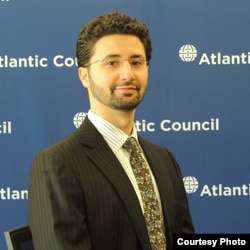With President Barack Obama setting a new strategy to combat Islamic State militants (also known as ISIL or ISIS) in Iraq and Syria, analysts say he will need to build a broad-based coalition of international and regional players to support those efforts.
But they also point out it isn’t clear who those partners will be, what they have to offer, and what they hope to accomplish.
“There has been some confusion on the part of this administration in terms of what the real objective is,” said Bilal Y. Saab, an expert on Middle East security at the Atlantic Council.
“When we talk about defeat, ultimately we really want to talk about defeat of the ideology. So it’s beyond the movement of ISIS itself,” Saab said.
That, he said, will require fixing the broken political systems in Iraq and Syria and providing opportunities for disenfranchised youth.
“These things need a lot of time,” he said. “But you really can’t stay on the sidelines and wait for them to materialize because the enemy, meanwhile, will grow, adapt and acquire new capabilities. And that’s exactly what you want to try to prevent.”
In the interim, he believes the U.S. should continue airstrikes to disrupt IS and keep it on the run.
“Essentially, what Washington is trying to do right now is buy itself some really precious time so that the politics get fixed or at least put on the right track,” he said.
Avoiding past mistakes
But analysts caution the U.S. against taking too active a role in what will be a lengthy and bloody conflict.
“Foreign militaries attacking Arab lands in cahoots with Arab autocrats is a recipe for catastrophe,” said Rami Khouri, director of the Issam Fares Institute for Public Policy and International Affairs at the American University in Beirut.
He points to the U.S.-led invasion of Iraq and the 1979 Soviet invasion of Afghanistan that gave birth to al-Qaida.
Groups like al-Qaida and IS, he said, see themselves as trying to protect Muslims from both corrupt dictators and foreign aggressors.
“Foreign military intervention creates chaos on the ground,” Khouri said. “It opens up opportunities for people to recruit and train and mobilize and organize.
"You have that now happening with the Islamic State and it happened before, on a smaller scale, with al-Qaida in Afghanistan, Pakistan and Yemen,” Khouri said. “You’ve got groups like this in Nigeria, Mali, Somalia and Libya to a smaller extent—and this is a real problem.”
“So the fighting that has to take place militarily to contain them and to drive them back and drive them out and finally extinguish them, hopefully, that has to be done mostly by the local people and also, in some cases, with foreign assistance," Khouri said. "So there definitely is a role for foreign military involvement in close coordination in support of local fighters on the ground.”
Regional response
The U.S. coalition so far consists of 10 members: The U.S., Britain, Canada, Australia, Denmark, France, Germany, Poland, Italy and Turkey.
The State Department says as many as 40 countries have contributed to U.S. efforts in Iraq in the form of humanitarian aid and donation of arms.
Secretary of State John Kerry is in the region this week to drum up broader regional support.
The way Khouri sees it, three groups should take the leading role in fighting IS.
“One group would be those in the immediate area of the Islamic State--that’s mostly the Sunni tribes of northeastern Syria or northwestern Iraq,” Khouri said.
“The second group is the governments in those countries, Iraqi or Syrian," he added. "And the third line is the other governments and other movements in the region who might want to go and help the Iraqis against the Islamic State.”
Kurdish Peshmerga forces have been fighting Islamist militants in northern Iraq since June, and Sunni forces have been on the offense since at least mid-August.
For the first time last weekend, they took part in a ground operation alongside Iraqi forces, securing a dam that IS militants had been trying to take for weeks.
After the fall of Saddam Hussein’s government-- and in the wake of their political marginalization by former prime minister Nouri Al-Maliki--thousands of Sunnis joined Islamist militants in Iraq.
But many now say they are willing to turn against IS if they are given a voice in the new government of Haider Al-Abadi, who was confirmed this week as prime minister.
But in Syria, any U.S. effort against Sunni militants is liable to be seen as helpful to President Bashar Al-Assad.
“There is a lot of loose talk about what it is we might do in Syria,” said Dartmouth College’s Daniel Benjamin, who served as State Department counterterrorism coordinator during the Clinton era.
“And it seems to me that government spokesmen have left the door open to a potential punitive strike against leadership elements of ISIS based in Syria," he said. "But I think the chances of any serious cooperation between Washington and Damascus against ISIS is extremely low.”
Gulf outreach
The Arab League Monday called for taking drastic action against extremists like IS, but stopped short of expressing support for the U.S. effort.
Saudi Arabia announced it will host talks in Jeddah this week with officials from Egypt, Turkey, Jordan and other members of the six-country Gulf Cooperation Council.
The United Arab Emirates released a statement last week expressing support for regional and international efforts against terrorism, not just in Iraq and Syria, but wherever it is found.
Gulf countries, particularly Saudi Arabia and Qatar, have been criticized for their support Sunni rebels against Bashar Al-Assad and for turning a blind eye to the flow of funds from wealthy donors to IS.
“Washington has been very critical in private of Saudi Arabia’s failure to really address private terrorist financing from inside the Kingdom to outside groups," said Lori Plotkin Boghardt, an expert in Gulf Politics at the Washington Institute for Near East Policy.
But this has changed, she said, particularly in recent months.
“As the Saudis have found out that ISIS is colluding with Saudi citizens inside the country in attacks against national and foreign targets in the country and in assassinations, the Saudis are very interested in cutting down right now on any kind of support to ISIS and other formerly Al-Qaida linked groups,” Boghardt said.
The Atlantic Council’s Faysal Itani does not see Gulf countries participating militarily in Syria and Iraq.
“Where they have strength or an advantage is in their resources, their financial clout, and in the fact that there has been quite an extensive intelligence outreach between the Saudi and the Qatari security agencies and many of the fighting groups active in Iraq and Syria,” he said.
One other neighbor stands to play a key role in the fight against Islamists in Iraq and Syria: Iran, which has been blamed not only for fueling Iraq’s civil strife through its support of the Maliki government and, more broadly, for driving the Shia-Sunni divide that has destabilized the entire Middle East.
"What many, if not most, analysts don't know is that Iran and the United States tacitly cooperated in their fight against Al Qaida in Iraq in the past and they are doing the same today with ISIS,” said Atlantic Council’s Saab.
"Is there a risk of the United States being perceived as siding with the Shiites? Absolutely,” Saab said. “But should policy be at the mercy of perception? Absolutely not."









